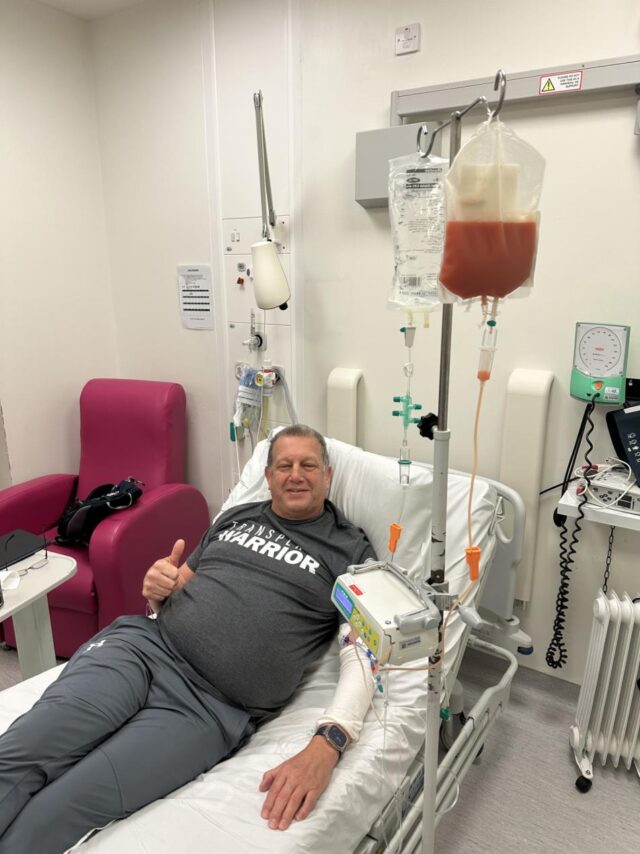A KEEN cyclist who was diagnosed with leukaemia is supporting leading charities Leukaemia Care and Leukaemia UK to help raise awareness of the blood cancer’s warning signs and stop it devastating people’s lives.
Tony Hayes, 59, from North Weald was diagnosed with acute myeloid leukaemia (AML) in 2023 after struggling with extreme fatigue. Alarm bells were ringing when a regular blood test to monitor Tony’s Type 1 Diabetes found some abnormalities in his blood, Further tests confirmed Tony had myelodysplastic syndrome (MDS) which progressed to AML the following year. Following chemotherapy and a successful stem cell transplant, his condition is now stable and regularly monitored with blood tests.
Tony said: “When I was diagnosed, I was told that without treatment I would only have 18 months to live which was a massive shock. Treatment was a long and difficult road with good and bad days, alongside persistent tiredness. Even now, I am very tired by lunchtime.
“My partner, Debbie, and her positivity kept me going. So, it’s something I want to give back to others so it’s not all doom and gloom. I am in an online group for people with AML so I try to send positive comments to people newly diagnosed – I don’t dress it up – it’s going to be hard – but I tell them that I was in the same position and now I am here.”
Tony is showing his support for Leukaemia Care and Leukaemia UK during Blood Cancer Awareness Month (September). The two charities have released new findings from a YouGov poll of 2,000 UK adults which found that less than a sixth (14%) of the UK adult population are able to identify all the four main symptoms of this deadly blood cancer. These are unusual bruising, unusual bleeding, fatigue, and repeated infections.
The organisations say this is contributing to more than a third of those diagnosed finding out the life-changing news at A&E. Throughout the UK, there are around 10,000 people diagnosed with leukaemia every year, and almost 5,000 deaths. Annually, 37% of those diagnosed with leukaemia receive this news in A&E – more than any other cancer type1.
In addition, people diagnosed with acute myeloid leukaemia (AML) are disproportionately affected as over half of them are diagnosed in emergency settings. This type of leukaemia is particularly aggressive and develops quickly, so early diagnosis and treatment are even more essential.
Leukaemia Care and Leukaemia UK have joined forces for their annual Spot Leukaemia campaign which aims to raise awareness of the signs and symptoms of this type of blood cancer. The charities are urging anyone experiencing any or a combination of the four most common symptoms to request a full blood count from their GP, a simple yet vital test that can lead to early diagnosis and significantly improve survival rates. According to guidelines from the National Institute for Health and Care Excellence (NICE), a blood test for leukaemia should be carried out within 48 hours.
Every day, 27 people in the UK are diagnosed with leukaemia, and currently, over 50,000 are living with the disease. Despite common misconceptions, leukaemia is not just a childhood disease as it predominantly affects those over 65.
Fiona Hazell, CEO of Leukaemia UK, said: “We’re so grateful to Tony for supporting our Spot Leukaemia campaign. His harrowing experience, alongside the new data we have, highlight the real and urgent need to raise awareness of the signs and symptoms of leukaemia. That’s why our Spot Leukaemia campaign is urging the public and medical communities to both recognise the warning signs and also the importance of requesting a blood test.”
Leukaemia UK and Leukaemia Care are urging the public and healthcare professionals to familiarise themselves with the symptoms of leukaemia and to contact their GP and request a blood test if they have any concerns.
Colin Dyer, CEO of Leukaemia Care, says “The findings call for immediate action. Delayed diagnoses not only devastate lives but also strain the NHS with increased treatment costs. We hear on a daily basis via our support services about the impact this has on patients and their families.
“Knowing the signs and symptoms of leukaemia and not being afraid to ask for a blood test from your GP is really important and something which we will continue to campaign for. Early diagnosis saves lives”




